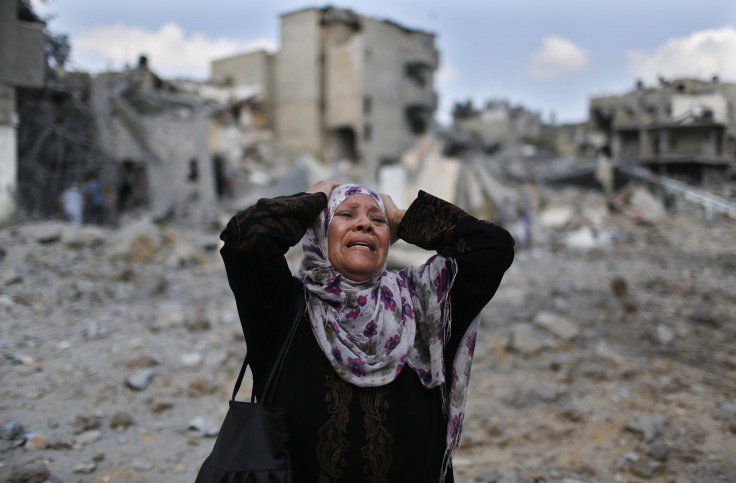Hamas Loses Grip On Gaza Government Amid War, Poverty, Disillusionment

GAZA CITY, Gaza Strip -- More than 1,400 people have been killed here as a result of three weeks of fighting between Hamas militants, who are currently in control of Gaza, and the Israeli military. Each day rockets are fired from Gaza into southern Israel (or beyond), and the Israel Defense Forces retaliate by bombing what it says are Hamas targets, which has resulted in huge civilian casualties. Palestinians living here have become victims of a war that is fueled, at least in part, by an organization many of them say they do not fully understand or accept.
“We thought they believed in our cause,” a well-known activist and blogger in Gaza, who requested to remain anonymous for security reasons, said. “Everyone loved them before 2006. But whenever you become a political regime you start lying.”
Hamas was elected to power in Gaza in 2006, beating the ruling Fatah party led by Palestinian Authority President Mahmoud Abbas, which remained in charge in the West Bank. That victory changed the course of relations, and negotiations, between the Palestinian Authority and Israel -- the latter has designated Hamas a terrorist organization, as have the United States and the European Union.
Tired of corruption in the Palestinian Authority, many Palestinians in Gaza City, the biggest urban center in the 1.8 million-people Gaza Strip, said they saw Hamas as a force that would lead them in a new direction. But since gaining power, Hamas has not been able to pay salaries to public employees for months now, and is becoming increasingly less involved in the day-to-day life of the Gaza Strip, where government has broken down completely.
“The war came and I feel like they don’t give a s--t about civilians,” said Mariam Abuamer, a university student. “I can see no future here. I am trying to leave.”
But now that it’s wartime in Gaza, many Palestinians do not see Hamas in black and white, especially while Israeli fire is constantly hitting civilian areas. In many ways, Hamas is the only armed force defending Gaza -- but its rockets are the stated reason for the Israeli campaign, which is also targeted at the smuggling tunnels Hamas uses to get weapons in. But in the Gaza Strip, one person of working age in four is unemployed, according to data from the Palestinian Central Bureau of Statistics, versus one in five for Palestine in general. Poverty in the Strip has been rising under Hamas, and in 2011 stood at 38.8 percent, more than double the rate in the West Bank.
While many Palestinians said they support Hamas trying to defend Gaza, they want a government that can provide more, including a stable economy.
“Hamas is worried the situation for them will get worse, so they are holding onto the money. The Palestine Liberation Organization had a better economy here. They stimulated the economy within Gaza rather than depend on foreigners,” the activist said.
During wartime, Hamas disappears completely, to hide from Israeli strikes targeting its members -- except when it reappears to launch rockets at Israel. So does discussion about the organization, except among journalists. Palestinians on the streets at times speak in hushed tones about how much money Hamas really has, and where exactly they think the tunnels are, which no one really knows.
In Gaza City there are no signs of Hamas, except for the few spokesmen who at times show up at Al-Shifa Hospital to comment on large-scale Israeli bombardments. There are no police in the streets and no security personnel patrolling. Some vital services, including trash pickup, some health care, and education are actually provided by the Palestinian Authority, even though it is not Gaza’s government.
Palestinians here said they feel there is no true government in Gaza. Humanitarian organizations have tried to fill the gap, providing health services, financial support, food and shelter, but with each passing day and the growing number of internally displaced people to cope with, they are having a hard time providing. The United Nations Relief and Works Agency alone is currently sheltering more than 220,000 people. Robert Turner, director of the UNRWA Gaza office, said the situation here is especially difficult because there is “no one in charge” in the government.
Many Palestinians in Gaza said they are in support of the resistance, but against Hamas. A resistance movement against Israel, Abuamer noted, existed long before Hamas was elected. (The First Intifada began in Gaza in 1987). That resistance, she said, is still active in Gaza, but is suffocated in the international media, which focuses only on Hamas.
“The main point of the resistance is to tell Israel that they cannot keep doing this to us. People are supporting this sentiment more than they were in the last wars,” the activist said.
“People like me who don’t like Hamas are not putting that much pressure on them,” she said. “We don’t feel like we have a choice. We need someone that would make people love him and is good at negotiations.”
But it may be difficult to find a new leadership among the existing Palestinian parties, Abuamer said, because in some ways they are all connected. She said Fatah plays almost no role in the current conflict, but that the Palestinian Islamic Jihad Movement is thought to be helping equip Hamas with weapons.
Turner, the UNRWA Gaza office director, said Thursday that this conflict was more uncertain than every past confrontation. Now, there is a cease-fire every few days, which always falls through. And while the IDF hinted at a possible end of the operation this week, there is no sign of the fighting letting up.
“We are not meant to have a normal life,” the activist said. “We are Palestinians. We were born to fight.”
© Copyright IBTimes 2024. All rights reserved.




















